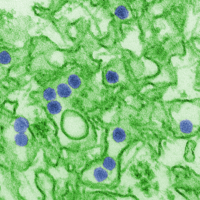
Photo from wikipedia
OBJECTIVE To know the evidence available in the literature on the effects of the zika virus in children development after fetal exposure. METHODS This is an integrative literature review with… Click to show full abstract
OBJECTIVE To know the evidence available in the literature on the effects of the zika virus in children development after fetal exposure. METHODS This is an integrative literature review with 16 scientific articles found in five databases (PubMed, LILACS, CINAHL, Web of Science and Scopus), based on the guiding question: "What are the effects in the development of children aged 0 to 6 years exposed to the zika virus in the fetal period? The STROBE statement was used for data extraction and evaluation of primary studies. RESULTS Exposure to the zika virus in the fetal period resulted in several congenital anomalies and/or changes in the central nervous system: microcephaly, ocular problems, neurosensorial problems, ventriculomegaly, intracranial calcification, cardiopathy, arthrogryposis, among others. CONCLUSION The zika virus is neurotropic; its effect in the fetal nervous system causes irreparable damage to the child, so health professionals, especially nurses, must intensify maternal and also childcare.
Journal Title: Revista brasileira de enfermagem
Year Published: 2020
Link to full text (if available)
Share on Social Media: Sign Up to like & get
recommendations!